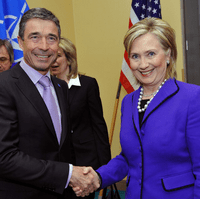At a meeting last week in Tallinn, Estonia, the foreign ministers of NATO's member states began addressing the question of what to do about the estimated 200 U.S. tactical nuclear weapons stationed in Belgium, Germany, Italy, the Netherlands, and Turkey. The missiles' controversial presence is shaping up to be the most important issue facing the alliance's heads of state during their November 2010 summit in Lisbon.
Many critics argue that these weapons have no plausible military purpose. In a World Politics Review briefing early last month, Johan Bergenäs offered a variety of reasons why the Obama administration should unilaterally withdraw the systems. Above all, Bergenäs argued, "Removing U.S. tactical nuclear weapons from Europe would generate a metaphorical boom for nuclear disarmament, re-energizing Obama's nonproliferation agenda and restoring confidence in its core objectives."
At the Tallin meeting, however, NATO spokesman James Appathurai stated that the foreign ministers had decided that none of the U.S. weapons would be removed unless all 28 member governments consented, a position that effectively gives every member the right of veto.

